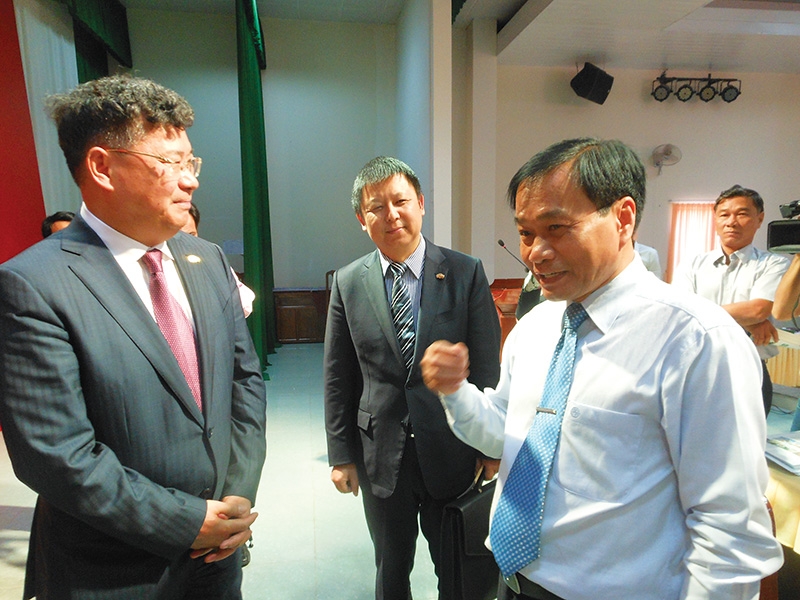Dong Thap makes leaps and bounds ahead across board
 |
| Dong Thap leaders are looking to capitalise on strong economic results |
Notably, despite continuing complications due to COVID-19, the province has still scored stable growth among the top players in the delta region, according to Dong Thap People’s Committee Chairman Nguyen Van Duong. The economic structure has been gearing in a positive direction, he said, and along with that, the agricultural sector has been developing rapidly and in an inclusive manner leveraging the efficiency of agricultural economic restructuring plan.
The sector grew an average 3.57 per cent per year and has witnessed remarkable improvements aligned with targets set in the agricultural sector restructuring plan attached to the implementation of the national target programme on building a new countryside model and reforming the production method promoting alliances between farmers and producers as well as market links to boost competitiveness.
As a result, the sector has succeeded in luring nearly 50 investment projects with value surpassing VND5.3 trillion ($230 million) into agricultural and rural area development.
The cities of Sa Dec, Cao Lanh, and Hong Ngu were recognised to have accomplished the task of building a new countryside model, whereas Thap Muoi and Cao Lanh districts were honoured to reach new countryside standards.
Dong Thap has also succeeded in shaping high-tech, green, and smart agricultural models, laying the basic fundamentals to adapt to climate change implications. The value chain of major product lines has also been constantly enhanced. Significantly, the club model has come into being and has increasingly proliferated, creating a new trend in production cooperation. About 100 clubs have been set up across 12 cities and districts, helping to strengthen links among members and create products suitable to market taste. A total of 22 co-operatives were established based on the club model, promoting partnerships between members to boost production value.
Industrial production has managed stable growth with increasing high-tech value. Due regard has been given to building and upgrading industrial zones (IZ), clusters, and border economic zone (EZ) infrastructure.
The occupancy rate of three major IZs reached 98 per cent, whereas that of 12 clusters surpassed 76 per cent. Craft production and occupation village development has received due regard too.
Local trade, services, and tourism activities have been fairly robust. Many products in Dong Thap have made them into retail distribution systems of leading businesses nationwide. Accordingly, the province posted an annual growth of 11.6 per cent in the total retail sales revenue of products and services. Meanwhile, the export value of major products in the province surpassed $1 billion annually.
The local business and environment climate has been improved vigorously, with the provincial competitiveness index ranking remaining high in the national tally, helping Dong Thap to lure 178 investment projects registered at more than VND18 trillion ($782.6 million). Of them, there are eight foreign investment projects valued at VND1.9 trillion ($82 million).
Dong Thap Chairman Duong noted that from now towards 2025, the province aims to realise the major tasks of efficiently implementing socioeconomic development planning to 2030 with vision towards 2050; focusing on developing agriculture, industry, construction and trade, and services; and increasing links to other localities in urban development, industry, trade, and services to serve the agricultural sector’s sustainable development.
It will also be important to push up vocational training and encourage labourers to work abroad, Duong explained, while stepping up investment into infrastructure, particularly in transport, and maintaining local advantages and strongly developing the food-processing industry.
Finally, to create breakthroughs in development, Duong spelled out the need for efficient implementation of digital transformation in the facets of building a digital government, economy, and society, thus helping to elevate the local economy in both integration and development.
What the stars mean:
★ Poor ★ ★ Promising ★★★ Good ★★★★ Very good ★★★★★ Exceptional
Related Contents
Latest News
More News
- Hermes joins Long Thanh cargo terminal development (February 04, 2026 | 15:59)
- SCG enhances production and distribution in Vietnam (February 04, 2026 | 08:00)
- UNIVACCO strengthens Asia expansion with Vietnam facility (February 03, 2026 | 08:00)
- Cai Mep Ha Port project wins approval with $1.95bn investment (February 02, 2026 | 16:17)
- Repositioning Vietnam in Asia’s manufacturing race (February 02, 2026 | 16:00)
- Manufacturing growth remains solid in early 2026 (February 02, 2026 | 15:28)
- Navigating venture capital trends across the continent (February 02, 2026 | 14:00)
- Motivations to achieve high growth (February 02, 2026 | 11:00)
- Capacity and regulations among British areas of expertise in IFCs (February 02, 2026 | 09:09)
- Transition underway in German investment across Vietnam (February 02, 2026 | 08:00)

 Tag:
Tag:




















 Mobile Version
Mobile Version